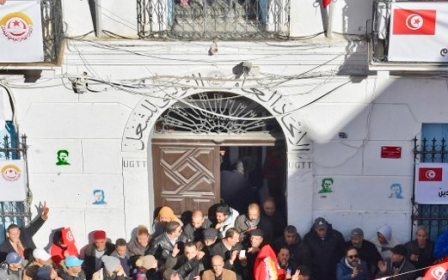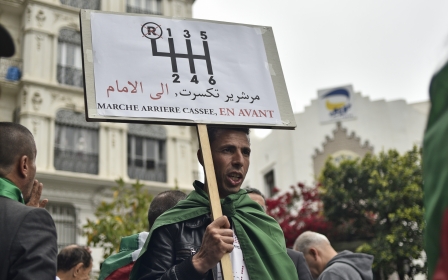Arabic press review: Saudi Arabia stops Yemeni minister from leaving Riyadh

Saudi Arabia bans Yemeni minister from travel
Saudi officials have banned Yemen's minister of state in its internationally recognised government from leaving Riyadh, Arabi21 reported, citing a senior Yemeni security official.
Mohammed Abdullah Keda, a former governor of Al-Mahrah province where popular protests are currently taking place against the Saudi presence in Yemen, has been residing in the kingdom for nearly three months and was told he cannot leave, according to Arabi21.
The travel ban has continued despite Keda’s regular communication with Yemeni officials who have told him to wait, the Yemeni official said.
"The motives behind the Saudi ban are still unclear and ambiguous," the source told Arabi21.
New MEE newsletter: Jerusalem Dispatch
Sign up to get the latest insights and analysis on Israel-Palestine, alongside Turkey Unpacked and other MEE newsletters
Israeli paper towels stirs outcry in Tunisia
Controversy in Tunisia over normalisation with Israel has resurfaced after Israeli products emerged in local markets, amid leaks that a senior government official may be involved in importing the goods, according to London-based al-Quds al-Arabi.
A popular market in Tunisia was reportedly selling paper towels imported from Israel with pictures of scented handkerchiefs, bearing the words "Made in Israel", circulated on social media.
Media reports have accused a member of Tahya Tounes, the party launched earlier this year by leaders formerly associated with Tunisia's ruling party Nidaa Tounes, of importing the towels.
But he has denied the allegations, claiming there was a mistake in the procurement process, according to al-Quds al-Arabi.
Tunisian General Labour Union called on the government to recall the product and clarify the sources of imported products and how they are distributed.
It also called on Tunisians to "be vigilant and alerted towards such goods and reveal the parties selling them, in addition to refraining from buying these products and boycotting all those who import and promote them".
Recently, a group against Israeli normalisation revealed that Tunisian tourist agencies have been selling trips to Israel.
Algeria's financial crisis
Economic experts have warned of an economic downturn in part sparked by the current political crisis in Algeria, according to the Algerian newspaper Echourouk El-Yawmi.
The impending economic crisis may eventually push Algeria to borrow money from the International Monetary Fund (IMF), the experts have said.
They predict that the crisis will cause economic growth to drop by 1 percent and inflation to increase drastically in 2021, unless a political consensus is achieved soon.
Economist Abdul Rahman Mataboul told the news outlet that the deteriorating economic situation in Algeria was the outcome of the protests that started in February, but also triggered by liquidity issues that pushed the government to print money late last year which caused inflation.
* Arabic press review is a digest of reports that are not independently verified as accurate by Middle East Eye.
Middle East Eye delivers independent and unrivalled coverage and analysis of the Middle East, North Africa and beyond. To learn more about republishing this content and the associated fees, please fill out this form. More about MEE can be found here.




